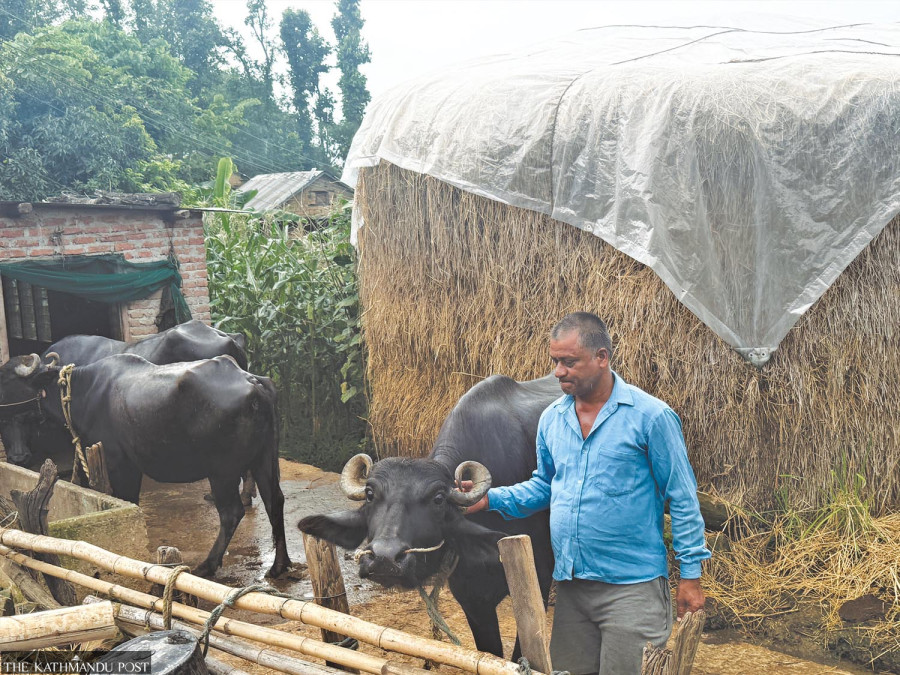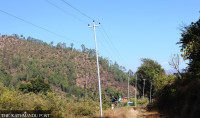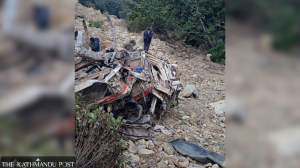Karnali Province
Rs340 million Murrah buffalo scheme fails farmers in Karnali
Farmers suffered huge losses as the improved Haryana buffaloes failed to thrive in the hills. Most farmers have already sold off the animals at throwaway prices.
Jyotee Katuwal
Two years ago, Man Bahadur Khadka from ward 11 of Birendranagar Municipality, Surkhet, bought two Murrah buffaloes from Nepalgunj’s Rahamat Suppliers at Rs150,000 each. He received a government grant of Rs75,000 per buffalo under Karnali Province’s much-hyped “Dairy Promotion and Livestock Feed Development Programme,” launched to boost milk production.
The initiative, introduced in 2018 by the provincial Ministry of Land Management, Agriculture and Cooperatives, promised farmers that Murrah buffaloes—an improved breed from Haryana, India—would produce far more milk than the local buffalo species.
Convinced, many farmers sold their native buffaloes and invested in the new breed. Around 2,600 Murrah buffaloes—both males and females—were imported for 10 farms across eight districts at a total cost of Rs340 million, including subsidies, sheds, and feed management.
But the ambitious project has largely failed. “Of the two Murrahs I bought, one died within a month. The other never conceived again. Our native buffaloes were better,” Khadka said, visibly frustrated.
Experts say Murrah buffaloes thrive in the Tarai region with proper feed and care but struggle in the hills and high-altitude districts like Dolpa, where cold weather, steep terrain, and scarce grazing land pose serious challenges.
“This is what happens when schemes are launched without proper studies,” said Dr Sajan Rokaya, chief of Dolpa Livestock Service Office. “Murrah buffaloes weigh up to 700 kg, almost double the local breeds, and require warm, dry sheds. Without such conditions, milk yield drops sharply, and many die.”
In Dolpa’s Thulibheri Municipality, farmer Buddhi BK lost his Murrah buffalo within five months when it slipped off a cliff. “Six others in the village died the same way,” he said. “We were told it would give 20 litres of milk a day, but we barely got a few litres. It was a big mistake.”
After five years, many farmers have sold off their Murrah buffaloes to urban traders at throwaway prices. Even former provincial livestock director Kapil Prasad Upadhyaya admits no separate feasibility study was conducted before launching the programme, saying decisions were made based on “farmers’ demand.”
The Karnali provincial government’s Murrah buffalo programme—already criticised for lacking a feasibility study—has now been mired in allegations of collusion, commissions, and irregularities. While farmers incurred losses, officials and certain supplier farms reportedly benefited.
Farmers allege that officials at the Directorate of Livestock Development forced them to purchase buffaloes only from select suppliers, mainly KC Dairy and Livestock Farm in Kailali, and Rahamat Suppliers in Banke. Payments were delayed or contracts even cancelled if farmers refused to comply.
Chhinchu Women Small Farmers Cooperative in ward 12 of Bheriganga Municipality received a Rs7.5 million grant to buy improved Murrah buffaloes. But when farmers rejected the low-quality animals at KC Dairy, then-acting director Mohan Giri allegedly threatened to cancel the entire programme, according to the cooperative’s chairperson, Uma Gautam.
“Farmers were alarmed when they saw the weak and aging buffaloes at the farm designated by the directorate, so we couldn’t pressure them to buy,” said Gautam. “We then visited other farms in Kailali where the farmers liked the animals, but in the end, the purchase was cancelled altogether.” Farmers eventually returned empty-handed after spending Rs200,000 on transport.
Similar accusations emerged from the Bheri Livestock and Agricultural Production Processing Cooperative in ward 11 of Bheriganga Municipality, Surkhet. Chairperson Navaraj Wali claimed the directorate withheld payments for six months because they did not buy from KC Dairy, forcing farmers to take high-interest loans to pay suppliers.
KC Dairy reportedly sold over 700 Murrah buffaloes across Karnali under the scheme.
Kismat Ali, operator of Rahamat Suppliers, alleged that bribe payments to the directorate’s acting director were necessary for securing contracts, claiming to have paid Rs700,000. “Without paying, no one gets their buffaloes approved,” he said, though he offered no concrete proof.
Director Giri has denied all allegations, calling them ‘baseless’ and saying, “I have not taken a single rupee. These claims are made because I served at the same office for a long time.”
Between fiscal years 2019-20 and 2023-24, the Dailekh District Livestock Office distributed grants for purchasing 568 Murrah buffaloes and bulls. Of these, 415 were supplied by Samim Farm in Kohalpur, 101 by KC Dairy in Kailali, 32 by Bhim Bahadur Nepali in Achham, and another 32 by Bishnu Yadav in Nepalgunj.
But according to Bakhat Nepali, chairperson of the Shatpratishat Progressive Agriculture Cooperative in Dailekh, most of these buffaloes are no longer in farmers’ sheds. “The agreements required farmers to keep the animals for at least five years, but when they produced far less milk than promised and struggled in the hill climate, many were sold off within months—some even slaughtered,” he said.
Nepali said they repeatedly requested local police, livestock offices, and municipalities to stop the sales and slaughtering of subsidised buffaloes, but no one heeded. “Many were simply loaded back on trucks and sent away before a year had passed,” he added.
In Surkhet, 896 buffaloes and 43 cows were purchased under the programme in six years, costing over Rs 80.2 million. Yet authorities have no record of where these animals ended up.
Suppliers themselves admit using illegal cross-border routes to bring in buffaloes from India to avoid high customs duties. “We can’t keep them on farms; we bring them only when there’s an order,” said Ali Darji of Rahamat Suppliers, which sold over 1,000 buffaloes in Karnali Province.
Despite the programme’s failure, the Provincial Agriculture Ministry continued spending under the scheme in violation of its own guidelines. The Auditor General has flagged Rs3.4 million in unsettled accounts and recommended a detailed investigation.




 14.12°C Kathmandu
14.12°C Kathmandu












